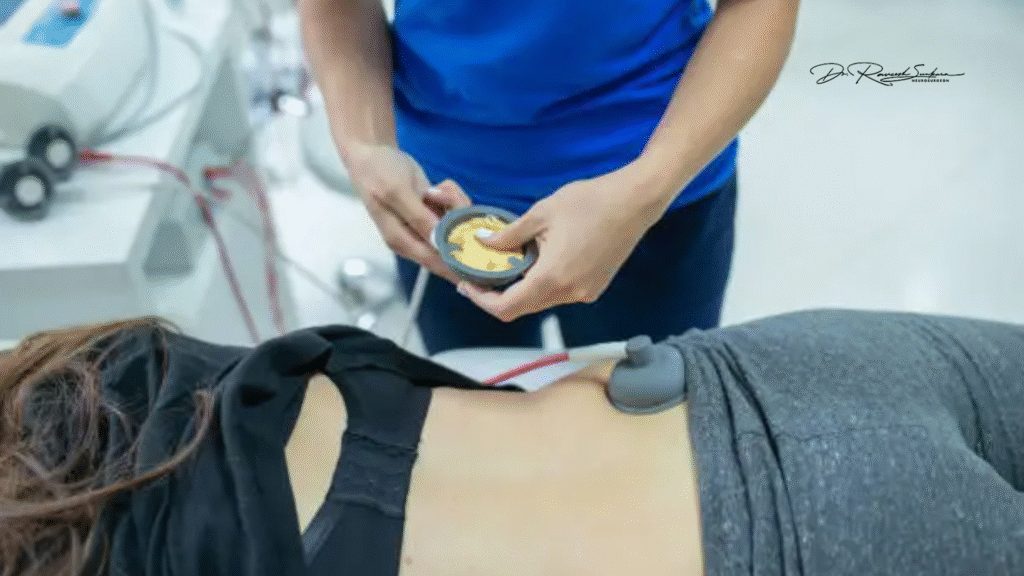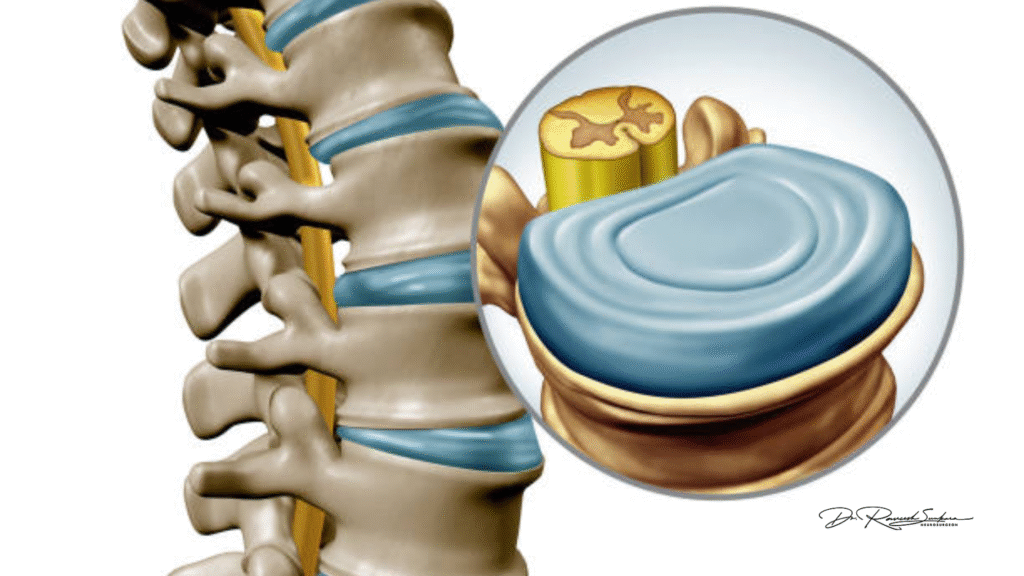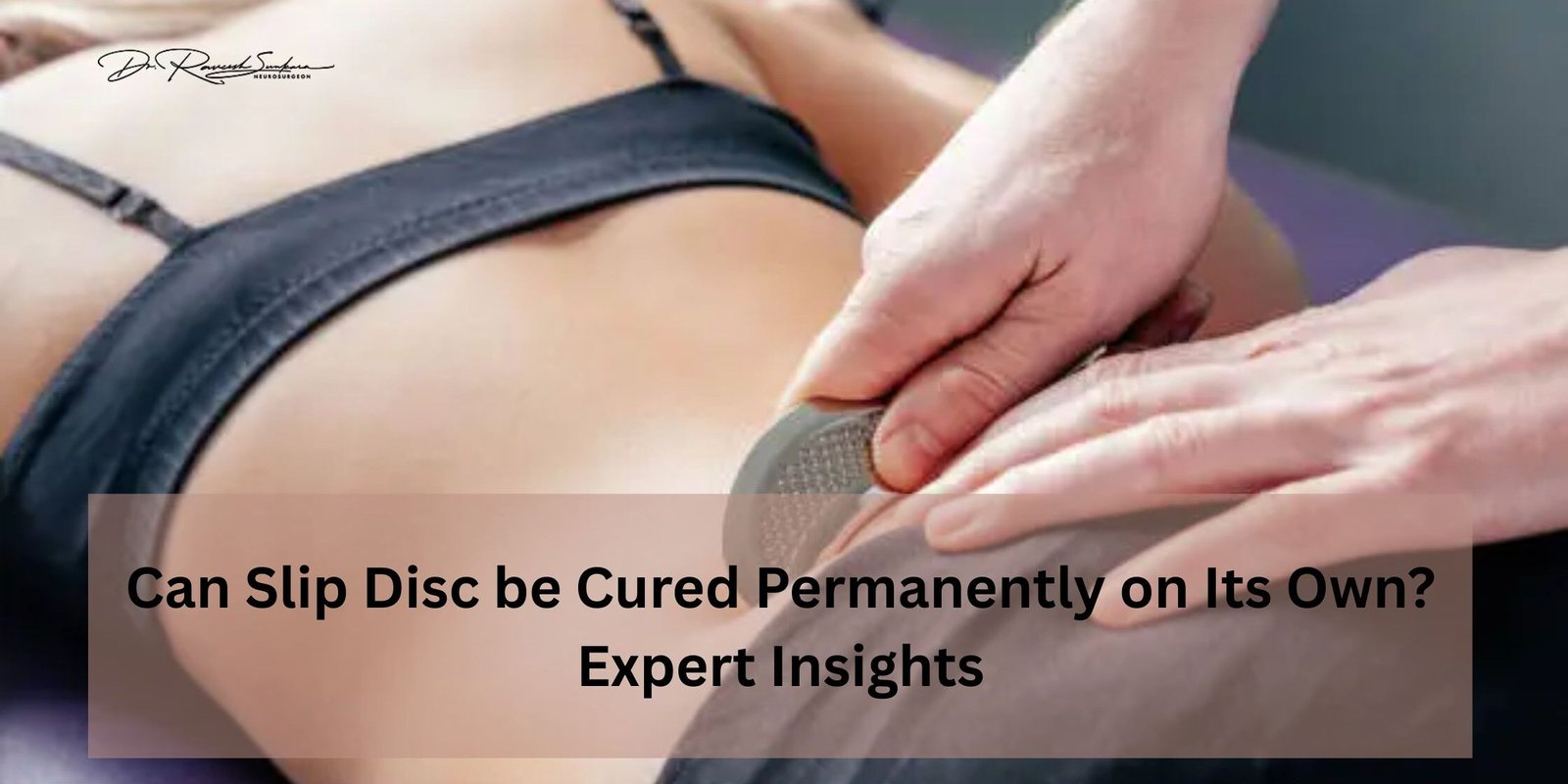A herniated disc does not usually cure itself completely, but getting assessed and treated early on can help you make a full recovery.
According to the American Academy of Orthopaedic Surgeons, between 60 and 80% of people will experience low back pain at some point in their lives, and herniated discs are some of the most common causes. Letting a herniated disc go untreated for too long can allow for further deterioration to occur and can negatively affect a person’s ability to move. Let’s understand, can slip disc be cured permanently, and what to do about it.
Key Takeaways
- A mild slip disc might be able to heal itself with just some rest, exercise, and good posture.
- If treated early, it can help avoid long-term back problems.
- Walking and homeopathy might assist mild cases, but surgery will only be suggested for severe cases.
- If pain or numbness persists longer than six weeks, then it is important to visit a medical doctor.
- To help reduce future complaints, it is always ideal to maintain correct sitting posture, have an active lifestyle, and maintain a strong back.
Understanding Slip Disc and How It Affects the Spine
Before addressing the question, can slip disc be cured permanently, let’s first define what this means.
A slipped disc, also called a herniated disc, occurs when the soft tissue that cushions the vertebrae of your spine bulges or ruptures. If this tissue falls out of the disc, it can press against nearby nerves or other structures, which can be the cause of pain, numbness, or weakness.
Some common reasons for a slipped disc may include:
- Posture and remaining in one position or sitting for long periods
- Lifting heavy weights incorrectly
- Not enough exercise or no core strength
- Obesity and ageing
- Sudden jerks or injuries

Can Slip Disc Heal Naturally Without Surgery?
The answer is based on many factors, including the severity, location, and lifestyle of the patient.
In many mild to moderate cases, the disc can heal over time with rest, physiotherapy, and lifestyle modifications. The body also has a fantastic ability, sometimes, to reabsorb the herniated material and thus reduce nerve compression. However, this process can take weeks or months to resolve, and without proper care, it may not be permanent.
If the symptoms of numbness, severe pain associated with movement, or difficulty walking persist longer than six weeks, it’s an indicator that you need professional care from a chiropractor for a slipped disc or spine specialist.
Stages of Slip Disc Recovery
| Stage | Condition | Recommended Action |
| Early (0–2 weeks) | Mild pain and stiffness | Rest, gentle stretches, pain relief |
| Moderate (2–6 weeks) | Pain radiating to the legs or arms | Physiotherapy, posture correction, slip disc belt |
| Severe (6+ weeks) | Numbness, weakness, chronic pain | MRI, possible surgical or alternative treatment |
This table gives a simple view of what to expect and when to seek help.
Effective Non-Surgical Methods for Slip Disc Relief
A lot of people will recover without surgery if they have the correct advice. Here’s how to do it:
1. Use of the Slip Disc Belt for Support
Slip disc belts give constructive support to the spine while maintaining posture. They relieve weight and compression on the disc while moving, which assists with pain. A slip disc belt should not be used 24/7 without a doctor’s approval.
2. Correct Slip Disc Sleeping Position
Choosing the proper slip disc sleeping position is essential. Most people will find relief sleeping on their back with a pillow under their knees, or if sleeping on their side, it should be based on the option of using a pillow between their legs to reduce compression on the spinal disc. Don’t sleep on your stomach.
3. Regular Exercises for Slipped Disc in the Lower Back
Gentle stretching and strengthening exercises promote flexibility and encourage healing.
Try these recommended exercises for a slipped disc in the lower back:
- Pelvic Tilts
- Partial Crunches
- Hamstring Stretches
- Bridges
You should always do these exercises with the direction of your physiotherapist to avoid any injuries.

4. Is walking good for a slipped disc?
Is walking good for a slipped disc is a common question. Yes, walking is good for slipped disc recovery, since it promotes healthy blood flow and flexibility in the back area, at the same time reducing stiffness in the spine, and it strengthens core muscles. Start slow; take short walks and gradually increase the distance to a comfortable level. Try to avoid uneven surfaces whenever possible.
5. Homeopathy Medicine for a Slip Disc
A few people prefer homoeopathy medicine for slip disc, as a more natural option in healing. The remedies can be adapted to help with inflammation, pain, and stiffness. Homeopathy can be used without complications or side effects; just consult with an experienced doctor before using any remedies.
Homeopathy is generally more effective for the mild-to-moderate cases of discs; mild and moderate cases do respond well to homeopathy. In severe disc bulges, slipped discs, such as in slip disc L4 L5 treatment, homeopathy, physiotherapy, and postural corrections often work better.
Also Read about
Herniated Disc vs. Bulging Disc
When Is Surgery Needed for a Slip Disc?
Surgery is required if:
- Pain lasts longer than 3–6 months
- You lose control of your bladder or bowels
- You have significant weaknesses or numbness in your legs
The slip disc operation cost will depend on the hospital, location, and technology used. On average, the surgery cost in India may be somewhere in the range of ₹1,00,000-₹3,50,000.
If you are searching for slip disc treatment near me, always make sure to see the best spine doctor in Hyderabad or an experienced consultant in neurosurgery. A top neurosurgeon in Hyderabad, like Dr Raveesh Sunkara, has restored normal functioning in many patients without unnecessary surgery.
Alternative and Holistic Approaches for Slip Disc Care
1. Chiropractic Treatment
A chiropractor for a slipped disc focuses on spinal alignment. Gentle manual adjustments may relieve stress on nerves, ligaments, and discs in the spine. It is advisable to see a certified professional to ensure one is in safe hands.
2. Ayurvedic and Homeopathy Treatment
Ayurveda and slipped disc homeopathy use natural remedies for symptom relief and controlling inflammation. For example, herbal oils, massages, or homeopathy can help to manage the pain associated with chronic conditions.
3. Lifestyle Changes
If you want to restore the health and well-being of your spine, you need to create more spine-friendly habits, like:
- Don’t sit for prolonged periods of time.
- You may need to change your chair to an ergonomic one.
- Stretch every hour while working.
- Maintain a good body weight.
- Strengthening your core.
Heal Yourself Properly with the Right Approach!
So, can slip disc be cured permanently on its own? To be honest, yes, in mild cases, with rest, suitable exercise, and professional advice. However, chronic or significant cases require professional assessment.
Regardless of whether it is physiotherapy, homeopathy, or surgery, early assessment and intervention is essential. Consulting Dr Raveesh Sunkara can be your first step toward lasting relief.
FAQs
What is the healing time for a slipped disc?
Mild cases can heal in around 4-6 weeks with rest and physiotherapy. In cases of severe slipped disc, it can take a few months or longer with surgical correction.
Will walking make the slipped disc worse?
If done correctly, walking will improve your recovery process. Avoid long distances and uneven surfaces during the early phase of your recovery.
Does surgery mean I have no solution other than surgery?
No, surgery is only necessary for severe nerve compression. Most cases of slipped discs will improve with conservative treatment.
Is homeopathy medicine effective for slipped disc recovery?
Yes, homeopathy medicine for a slipped disc can help reduce inflammation and pain in very early or moderate cases. Make sure you have a qualified practitioner who practices homoeopathy.
What is the best position to sleep?
If you sleep on your back with a pillow under your knees or sleeping on your side with a pillow between your legs can reduce strain to your back.







